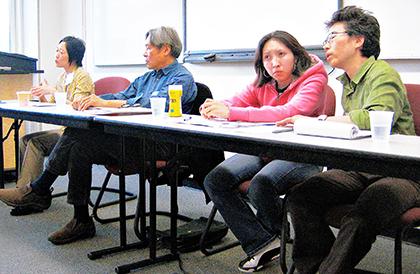By Anna Gustafson
Sweeping immigration reform is needed to address the exploitation of workers in Queens, including those in Flushing who can be unofficially barred from employment by employers who are angry over the individuals’ attempts to advocate for better wages or hours, speakers at a CUNY Law forum said last week.
“Bosses, especially a lot of bosses in Flushing, will put workers on a black list and say this person is problematic because they’ll be working for better conditions so don’t hire them,” Concepcion Sanchez, a member of the National Mobilization Against Sweatshops, said through a translator and fellow panelist JoAnn Lum. “We’ve got to get together — Latinos, Chinese, everyone — to fight these injustices and change these laws.”
Sanchez and Lum, both of the NMASS, joined CUNY Law professor Shirley Lung and CUNY professor Peter Kwong for the law school’s forum last Thursday titled “En La Lucha: Latino and Asian Low-Wage Workers.” (“En la lucha” is Spanish for “in the struggle.”) The two-hour event was sponsored by CUNY Law’s Center on Latino and Latina Rights and Equality.
“My mom came from Puerto Rico and worked in the garment industry, so this is an issue near and dear to my heart,” said Jenny Rivera, the event moderator and a CUNY Law professor.
Panelists said the federal government should implement immigration reform that is radically different from both past attempts and current proposals. Kwong, a professor of Asian-American studies, urban affairs and planning at Hunter College, as well as sociology at the CUNY Graduate Center in Manhattan, said one of the most recent attempts by the federal government to address immigration reform, the Employer Sanctions Act, has had negative repercussions that resulted in greater exploitation of foreign workers.
Under the act, U.S. Labor Department officials will investigate various places of employment and fine owners if they find undocumented workers. They frequently will also pass along the workers’ information to the federal Immigration Services, which could result in separation of families and ultimately deportation, panelists said.
The fear of these raids has therefore prompted workers’ silence over such issues as no pay for overtime — a problem for immigrant workers who frequently face 12- to 14-hour days, seven days a week — or other abuses in the workplace, speakers said.
“Sweatshop conditions are much worse than before” because employees are scared of speaking out for fear of deportation, Kwong said.
Lung, who before becoming a law professor was the executive director of the Center for Immigrants’ Rights, stressed the debate over immigration reform should focus on bringing together undocumented and citizen workers, who she said have been increasingly at odds with each other in part because employers will bypass non-immigrant workers for undocumented individuals because they do not pay them anything near union wages.
“Employers aren’t paying fair wages and saying you have to work 14 hours a day if you’re fired,” Lung said. “Even if you’re documented, how do you protest your working conditions if your employer says they can replace you with someone who’s undocumented?”
Employers have continued to find ways to exploit undocumented or immigrant workers, especially as there has been a large shift of workers from manufacturing to service jobs in recent years, according to Lum, executive director of the NMASS.
When groups like NMASS win cases against businesses over issues like low wages, the businesses will often “vanish,” meaning they will change their names in an attempt to not have to financially compensate victims, Lum said.
“Especially in Flushing, bosses aren’t fighting us on labor laws — they’re fraudulently changing the names of their businesses to get away from paying,” she said. “So employees will win cases in court but won’t be able to collect their money.”
Reach reporter Anna Gustafson by e-mail at agustafson@cnglocal.com or by phone at 718-260-4574.
































